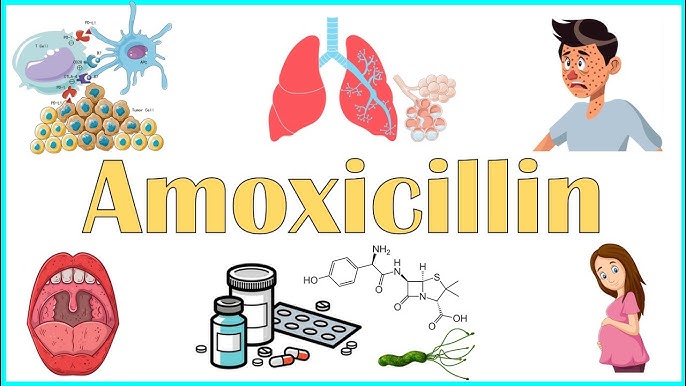Amoxicillin is a penicillin-type antibiotic that works by stopping the growth of bacteria. It does this by binding to a protein called penicillin-binding protein (PBP), which is essential for the formation of the bacterial cell wall. When amoxicillin binds to PBP, it prevents the formation of a strong cell wall. This weakens the cell wall and makes it more likely to rupture, killing the bacteria.
Amoxicillin is a broad-spectrum antibiotic, which means it can kill a wide variety of bacteria. It is commonly used to treat infections of the ear, nose, throat, respiratory tract, urinary tract, skin, and soft tissues. It can also be used to treat Lyme disease, anthrax, and other infections.
Amoxicillin is usually taken by mouth as capsules, tablets, or liquid suspension. It can also be given by injection, but this is usually only done in the hospital. The dosage and duration of treatment will depend on the type of infection being treated.
It is important to take amoxicillin exactly as prescribed by your doctor. Do not stop taking it even if you start to feel better, as this could allow the infection to come back. Also, do not give amoxicillin to anyone else, even if they have the same symptoms as you.
Amoxicillin is generally safe, but it can cause some side effects, such as nausea, vomiting, diarrhea, and rash. More serious side effects, such as an allergic reaction, are rare.
If you experience any side effects while taking amoxicillin, tell your doctor immediately.
Here are some of the bacteria that amoxicillin can kill:
- Streptococcus species
- Enterococcus species
- Listeria monocytogenes
- Haemophilus influenza
- Escherichia coli
- Actinomyces spp.
- Clostridium species
- Salmonella spp.
- Shigella spp.
- Corynebacteria spp.
It is important to note that amoxicillin is not effective against all bacteria. Some bacteria, such as Pseudomonas aeruginosa and Proteus mirabilis, are resistant to amoxicillin.
If you are taking amoxicillin, it is important to be aware of the following:
- Do not take amoxicillin if you are allergic to penicillin or cephalosporin antibiotics.
- Tell your doctor if you are pregnant or breastfeeding.
- Tell your doctor about all other medications you are taking, including over-the-counter medications and herbal supplements.
- Do not drink alcohol while taking amoxicillin.
- If you have any questions or concerns about taking amoxicillin, talk to your doctor.
